Three Poems by Craig Morgan Teicher
by Mark Bibbins, Editor
To an Editor Who Said I Repeat Myself and Tell Too Much
The mouth works all its life to spit a vowel —
some long sound with feeling fenced in
by the sharp stops of a few right consonants, a howl
and a pen to keep it tame, a calm din
that won’t drown out the life it tries
to say, but won’t deny, either, that hell
is the sound we’re all born making, the cry
learned before the womb, which we tell
and tell and tell — too much, of course —
in the hope of draining (I must state it plain,
for there is no other subject — death, divorce,
depression — all words stand for pain)
that well, as if there were anything else to do.
You don’t enjoy my poems? Me neither. Fuck you.
True
If it were true it would make more sense. It must
not be true. It makes too much sense. The truth
makes no sense. Too true. It’s too good to be true.
It makes no sense, it must be true. Or must not.
But you need it to be true. It’s only true if you believe.
You believe so it must be true. You believe, so
it cannot be true. You believe in truth. What you
believe is the truth. So the truth is what you wish.
Wish come true, no longer a wish, but the truth,
which makes no sense, so cannot be true. The truth
is not the truth. Tell me the truth. Lie to me. Lie
to tell the truth. Little white lie. How tell the truth
from a lie? The truth is white, like a light, like a lie.
It’s a lie. If it were truth, it would make more light.
Variations on the Moment of Apprehending the Extent of One’s Responsibilities
1
that minute subdivision of time
during which the full consequence
flickers, just before the door clicks
shut but just after you could have
stopped it from shutting, when
you realize, your hand already
seizing your empty pocket, that
you have left your keys inside
2
that useless subdivision of time
in which what really happens
could never have been
prevented — it yawns so wide
though you can barely fit
a blink into it, like the moment
just before the door clicks shut
but just after you realize
3
you have left your keys inside.
So many things are unsatisfactory,
like the moment, like the baby
monitor, like your hand already
seizing your empty pocket,
useless. Consequence
flickers, what really happens
could fit behind a blink
4
that useless subdivision of time
in which what happens could fit,
flickers, could never have been
prevented, is so unsatisfactory
like the moment just before
the door clicks shut but just after
you could have stopped it from
closing with the back of your foot
5
your hand already seizing
your empty pocket, as if you could
go back, your keys inside,
and begin again, take your clothes
off, crawl back, deep into bed.
So many things are unsatisfactory —
that you have left your keys inside,
that this is when you realize
6
this could never have been
prevented, that what you realize
is not only useless but infinitely
painful, because minute,
irrevocable, like the baby
who flickers in the video monitor,
a blink in which the door clicks shut.
You could never have stopped it
7
till now, just after you realize
so many things are unsatisfactory,
just before, your hand already
seizing your empty pocket,
the full consequence flickers
behind a blink that is now
your measure of time, useless
because it already happened.
Craig Morgan Teicher is the author of Brenda Is In the Room and Other Poems, Cradle Book, and another collection of poems with a shifting title due out in about two years. He is a VP on the board of the National Book Critics Circle.
For more poetry, visit The Poetry Section’s vast archive. You may contact the editor at poems@theawl.com.
Ghana's Email Scams are Hard Work
“We kind of liked the idea of living off the back of American stupidity, so we hooked up with a Sakawa gang”! The email fraud industry may or may not die out in the wake of Ghana’s oil discoveries, but it’s definitely fascinating.
Some Measured Thoughts On This Year's NBA Hall Of Fame Class

On Monday evening, I watched the National Championship game at Old Town tavern, which was a relatively brainless (but in no way shocking) decision, as the mounted TV’s 25-inch screen appears to be coated with a viscous substance that I will assume, for all intents and purposes, is hurled biscuit gravy. And by hurled, I mean thrown. Of course. I was meeting a friend and neither of us are exactly rocket scientists, or even scientists or any kind, so we decided, “Hey let’s watch the game on the worst TV left in America.”
In the midst of watching the UConn Man-Huskies (probably the lousiest National Champion I have ever witnessed) perform an alien autopsy on the Butler Bulldogs (about as well coached a basketball team as I have ever seen crap the bed) we began speaking about the 2011 Basketball Hall of Fame inductees announced earlier that day. I casually mentioned that, without Reggie Miller, I thought it was a very weak class, save for my man Arvydas Sabonis, the Lithuanian strongman, who was an incredible player in his day — sometime around the 16th century. Sabonis was, without question, the best passing center to ever play the game. He is what Tex Winters (creator of the triangle offense and fellow inductee) dreamt about when he came up with his simple-complicated plan of having big-galoot-as-rock-distributor.
There were a couple of others that I won’t pretend to know or care anything about. And also, wickedly sideburned Artis Gilmore, another big galoot (albeit one that couldn’t really pass) and a guy who was on the Globetrotters from a time when the team could actually play full games without taking time off to clown rich white kids courtside with pails of confetti. But the committee proclaimed them all to be fit to be feted, even the ladies, and so I’ll take their word on that.
Or will I?
For starters, I had my doubts about Chris Mullin’s inclusion. When I said that, I thought that my friend’s exaggerated double take would actually paralyze him. I loved watching Mullin at St. John’s, but I can’t ever remember him being the best player on his NBA team, the Golden State Warriors, despite having five insane years, averaging 25 and 5. (Mitch Richmond was always a little better.) And I could name 20 guys that scored as many or more career points that are not Hall of Famers, who could take him. (Here are three right off the bat: Bernard King, Spencer Haywood and Sidney Moncrief. Trust me, I have 17 more all ready to go.)
But when I got home and looked up Mullin’s career stats — because that’s when I do my best research: hours after I make a blanket statement in a bar — I realized that he deserved to be included because of the totality of his career: high school, college, the NBA and international. He’s still borderline in my eyes, but now he’s on the good side of that border.
But I’m firm on Dennis Rodman, whose inclusion is the real wellspring of my ire. His presence in the Hall of Fame rewards one-dimensional players for winning championships in a team sport. He was a two-time Defensive Player of the Year (’90 and ’91) but he was only named to the NBA All-Star team twice as well (’90 and ’92.) He may have five championship rings, but the Pistons, Bulls and Spurs were great, deep squads.
In some games, Rodman scored zero points, and in none of them, was he an offensive force. He may have averaged 13.1 rebounds per game over his career, but he only scored 7.3 points a game. In the playoffs, his number shrunk to 9.9 and 6.4. Putting an incomplete player like him in the Hall is like crowning a headless woman Miss America.
I’m not dismissing defense. While Rodman was named NBA’s All-Defensive First Team seven times in his career, I don’t hold that feat in the same regard as Michael Jordan’s nine times, or Kobe’s eight. Why not? Because those players added defense to the existing burden of scoring, and setting other players up. Running an offense. Playing on both ends of the court. Rodman never had to worry about anything other than not losing his head, rebounding and fronting on defense. Sure he was great at it, but he never elevated his game to be anything more than what he was: the third or fourth best player on any team on which he played.
But it’s too late now, I realize: once again, no one asked me and now a staggeringly one-dimensional player is in the Basketball Hall of Fame. And I’m sure that in his eyes, everything from here on in is gravy.
Tony Gervino is a New York City-based editor and writer obsessed with honing his bio to make him sound quirky. He can also be found here.
Photo by Eric Molina via Flickr.
Astrologist Susan Miller Predicts Government Shutdown
With Mercury retrograde until April 23, chances are strong that the US government will run out of money and temporarily shut do on Friday.less than a minute ago via web
Astrology Zone
astrologyzone
I guess it’s official. (via every woman we know on the Internet)
Jacob Lusk, The First Extrasexual Soul Singer
by Jay Caspian Kang
A few quick notes on Jacob Lusk’s “American Idol” performance last night: I think we can collectively agree that what happens at 1’22” needn’t be discussed. He’s air-humping the lady who wrote “Man in the Mirror.” But 1’34”-1’44”!
He starts with the classic Etta James move — close your eyes, lift your hand up near your head as the note fucks up the audience, and then get straight into the next move because fucking up the audience doesn’t mean shit to you. X-Tina also does this pretty well, but the only young gun who really knows how to pull that move off right now is Adele. (Being overweight helps with this move. I don’t know why, but it does. If you’re skeptical, go to YouTube and watch 5 skinny Aretha videos and 5 fat Aretha videos. Then report back to me.) Rihanna has too many “Hey, aren’t I the cutest puppy, EVER?” moments to pull off the move. Katy Perry is too busy burning down barns and taking out teenager’s eyes or whatever the hell she’s doing with those chestal pyrotechnics. Charlotte Church has the pipes for it, but whenever she scrunches up her face, everyone laughs.
Lusk then goes into the craziest strut to ever be strutted on the Idol stage, a list of struts that includes John Stevens’ Crocodile Rock strut, which, as as my redheaded brothers and sisters know, was a strut that put back the Ginger Assimilation Movement about fifty years.
Strutting has always been part of the soul singer’s repertoire, but it’s generally approached with small steps. For example…
and…
(Two notes on this video before I get back to Lusk and strutting. Please to go to 2’09” and see what Michael does in that alleyway. I think that might have been the moment when he became the King of Pop. I mean, who but the King gets away with that? Also: the girl in this video is impossibly hot.)
The big-step strut is usually done by female soul singers, none better than Tina Turner, who turned the big-step strut into a marketing campaign. (The worst big step-strutter, of course, is Celine Dion. T-Boz from TLC and all of Salt-N-Peppa are notable standouts in this category.)
I mean, if you’re busy and don’t feel like watching the whole thing, skip to 2’10”. But you’d be a fool.
Lusk is not afraid of breaking out of the entrenched gender categories that have created a rigid dichotomy between — uh, hmm, line between? How do I do that thing where you ironically write in academic speech mode? My major in college was drunken fishing with a minor in shooting TVs with shotguns — anyway. What I mean is that Jacob’s distribution of male to female moves is probably somewhere around 50–50, which, in my humble opinion, is why he is so goddamn entertaining. Throw in the fact that he has gender-blow-upping vocal range, and no body hair, and you have the first, genuinely extrasexual soul singer. Lusk is somehow every sex at the same time. He’s the opposite of KD Lang.
Speaking of “River Deep, Mountain High,” I have no words for contestant Pia Toscano. Except these: when the 666 Beast comes out of the ground, flanked by hordes of demons, Pia will summit a mountain, eyes ablaze, where she will meet the son of Satan. She will smile her last smile, unhinge her jaw and hand it over to the Beast. That chin will be the cornerstone of the First United Temple of the Fucking Devil.
Jay Caspian Kang’s debut novel, The Dead Do Not Improve, will be published by Crown in 2012.
If You Haven't Yet Seen "Win Win," You Should Go See It
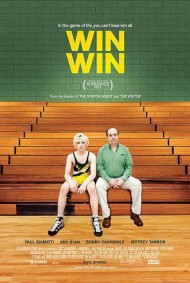
Remember the movie Garden State from a few years ago that was supposed to be about New Jersey, and was for a while, and was pretty good for like an hour or so, but then it got so bad and fake and sappy at the end that it ended up being more about somewhere else? Hollywood, I guess? Of course you remember. The soundtrack changed your life.
That movie really ticked me off. More than it should have, probably — like I said, it had some good things going for it. But because I’m from New Jersey, and have an emotional attachment to the place, I find myself disproportionately invested in work that represents it. I wish Garden State hadn’t been called Garden State, and had instead been called, I don’t know, Feelings Are Important or something, so the new movie Win Win could have been called Garden State. Because Win Win does everything right all the way through. Win Win is the best movie about New Jersey in a long, long time. It’s hard to tell, having seen it so recently (twice!), and this is a big statement, but I think Win Win might be my favorite movie about New Jersey ever, though I don’t much like the title.
And there are plenty of good movies about New Jersey. New Jersey Drive comes to mind, and Atlantic City and The King of Marvin Gardens. And Clerks and Be Kind Rewind. Oh, City of Hope, which I was reminded of recently. (That is awesome. But that might be less about New Jersey than these other ones — since I think the titular city is supposed to represent more of an American everycity type thing?) And The Station Agent, which was the first movie written and directed by the guy who wrote and directed Win Win, Thomas McCarthy. (Who also wrote and directed another great movie, The Visitor, but is probably most famous for playing a reporter who makes up fake newspaper stories on the last season of The Wire. He is very talented.)
McCarthy grew up in New Providence, the small, North Jersey suburb where Win Win takes place. The protagonist, played by Paul Giamatti, is a lawyer who also coaches the wrestling team at New Providence High School. He is a good, likeable person with a wife, played by Amy Ryan, and two daughters, but who has been having panic attacks because his legal practice is struggling. The wrestling team sucks, too, though that’s secondary. I don’t want to divulge too much of the story here, but Giamatti, acting out of desperation, commits a morally reprehensible act and suffers consequences — the first of which is that a sixteen year-old runaway with bleached hair winds up moving into the house.
The story is told well, and the acting is phenomenal. Particularly the scenes between Amy Ryan and Alex Shaffer, who plays the 16-year-old very much like a young Sean Penn. (If you are from New Jersey and find yourself increasingly affected by well-acted depictions of familial relationships as you get older — maybe it’s because you have a kid, I don’t know — or are otherwise an emotional sap, about halfway through this movie, you may find tears starting to well in your eyes at the simple appearance these two actors together on the screen.) And it’s really funny. Bobby Cannavale — who McCarthy also used in The Station Agent, and who plays Paul Giamatti’s best friend, who is in the midst of a divorce and having a midlife crisis — is extremely good at being from New Jersey. He grew up in Union City, maybe 15 minutes from New Providence.
The whole movie is really good at being from New Jersey. It looks great, which is to say evocatively ugly. Unfortunate fashion choices and horrible architecture under gray skies. Strip malls and too many cars and sickly yellow lighting in high-school locker rooms. But not overdone or cartoony. It looks real. And it gets it at the strength of heart that comes from living in a place that looks like this. Or at least that which we from New Jersey like to imagine comes from that. (If the sound of me singing “Meeting Across the River” or “Thunder Road” to myself as I type this comes through your screen as you read it, feel free to slap me back through the computer cables.)
The movie is about New Jersey as a place but also as an idea. It’s about hardship and fucking up at important things. About losing more than winning. But it’s about making it, in the end, about winning in a way that’s not so often depicted as winning. Because of friendship and love and second chances. So it’s about redemption, like lots of movies. But a different kind of redemption than lots of movies show us. All the redemption it can offer is beneath a dirty hood.
I'm Permalance No More! "Thank You Very Much for Your Contributions to AOL"
by Carter Maness
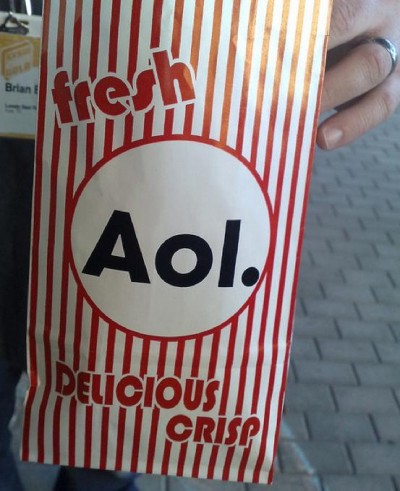
I left the corporate world in 2008 to write about music and entertainment because I wanted to work from bed, only leaving to maybe smoke joints with Kid Cudi while asking him pretentious questions about string arrangements. I don’t ask for much! During this time, my main gig has been permalancing for AOL Music. There, I aggregated content about hip-hop and indie rock, with a stray shot at actual journalism — attempts which were usually trumped by stories about Rihanna deboarding a plane or Jay-Z making funny faces at Madison Square Garden.
And then, in early February, AOL purchased the Huffington Post and handed over its editorial keys to Arianna Huffington. We knew there would be layoffs when the acquisition was announced. How could there not be? On topics like business and financial news, Huffington’s crew did the same aggregation with way fewer people for way less money. I suspected that AOL would make a few big name hires for image purposes while firing most of its full-time, fairly compensated editorial workforce.
Late on March 9, we began hearing about the first of the bloodbaths to come. It immediately took me back to nights in college and its periods of insane insomnia: Like those at Viacom before me, it was like following my own job security became my new beat. I couldn’t stop refreshing Google News and Twitter. Online media, despite its penchant for get-there-first wrongness or pageview-hungry reader-baiting, was still the only source for news: AOL was silent. Emails to my longtime editor went unanswered.
In the end, 20 percent of AOL’s in-house workforce was canned and nearly every editorial staffer, including my own editor with whom I’d worked every day for two years, was shown the door. The people I knew inside AOL told me that workers were fired in mass conference room terminations, with no reason given.
“My no. 1 priority is keeping all of our writers informed,” read a manager’s email four days after the layoffs. Other than telling us about a temporary freelance editor, I haven’t heard from her since.
For longtime employees, the transition was puzzling. “What’s so insulting was that it felt like there was no logic to the layoffs,” said a now-former AOL employee, who was let go in the first round of layoffs. “I was ranked in the top 20 percent of the company, awarded a merit-based salary increase, received a large bonus and was then let go with no explanation.”
Freelancers waited, uncertain, for two weeks. Emails were traded, each with links to incendiary stories about how we had no future. Hearing nothing from AOL, it became harder to sleep and focus. The joy of freelancing is that, while we’re essentially disposable, we at least don’t have to be overly concerned with office politics. But in reality, I had grown accustomed to what was, yes, essentially a full-time job with no office. I enjoyed the perks of someone without an office job — nooners and a very lax dress code — while becoming incredibly dependent on the trappings of someone who did.
There’s a real difference between getting outright fired and being left in purgatory. Being unemployed lights an immediate fire. You have to apply for jobs, hustle, tap all connections, sweat it out. An indefinite request to “just standby”? Well, what’s to do?
On March 22, AOL cut 30 of 70 online properties, folding many into existing Huffington Post sections, ending more altogether. AOL Music remained, was incorporated into the HuffPo website and even the higher-ups exuded optimism that all would be OK for now.
Then we got an email that night — sent at 2:30 a.m. — requesting our presence on a national conference call the next day at noon. My peers seemed encouraged by this. Maybe we had won this disgusting game of corporate King of the Hill.
“We want to make clear: there is no immediate change for you,” they wrote, in bold.
Maybe the definition of “immediate” is slippery? The content of that conference call could have been used as a model for what to do when a corporation really has nothing to say, plans more mass terminations, but wants to keep people contributing to its sites so that they don’t cease publishing before a series of cheaper cogs are put in place.
Because, yes: freelancer layoffs began on Monday, starting with the entire business and financial staffs. Then they came for the movie writers over at Cinematical, who received an insulting email termination with the offer that they could still write stories for free. Then, presumably because she pushed the Huffington model just a little too soon, the writer of that email was fired by Huffington’s new axe-man. Huffington’s quite sensitive to packaging and timing, so even those who embrace her scheme aren’t safe unless they do it right.
And then, yesterday, pretty much everyone left was let go in the most insulting way imaginable: A form email.
Hi there –
Thank you very much for your contributions to AOL. As we have discussed on calls and in emails, going forward our editorial direction is to build a great team of full-time editors, writers, and reporters. To that end, we are reducing the scope of AOL’s freelancer program.
Per the terms of your agreement with AOL, this note confirms the end of your engagement for content services effective Wednesday, April 6, 2011. Rest assured, you will be paid for your content and services through this date, disbursed to you per AOL’s regular payment schedule in late May.
We greatly appreciate your contributions and are available to answer any questions you may have. Please email freelancers@teamaol.com with any inquiries.
Hi there! Over my two-year tenure at AOL, I published over 350,000 words in approximately 900 posts — at least three novels worth of words. This was met with a blanket termination, with zero notice, in the form of an email that didn’t even include my actual name. Freelancers know they are just a number, but AOL really went out of their way to demonstrate that. Rest assured!
The toughest part is that it’s now near impossible for us to gain satisfaction from the merger’s probable failure. Tim Armstrong is already rich. Arianna Huffington is already rich. Those that treated the Mighty AOL Freelance Army like so much trash to be taken out have already gotten paid on our backs. At least we were “greatly appreciated” for helping them out.
Carter Maness is the associate music editor at NYPress and currently working on a chapbook based on Cam’ron lyrics. He works and lives in Brooklyn.
Photo by George Kelly, from Flickr.
Sarah Palin + Tyler Perry = Glenn Beck
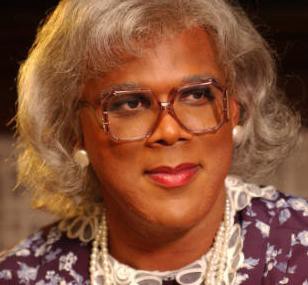
It seems too obvious to even say, but what with the celebrations about Glenn Beck leaving Fox News… well, yes: “Essentially, he’s leaping from venue to venue and using each to get richer, more famous, and more validated. Now he’s a free agent with millions of dollars at his disposal and more than two million loyal fans.” Hi, Sarah Palin quit her job as a governor because it restrained her and her income potential. Why wouldn’t Glenn Beck do the same thing? (Besides, he’s been gaming this out for ages.) You don’t want to be the talent: you want to be the owner. And he doesn’t need a channel, he just needs a studio. And setting up your own shop is all the rage these days. After Tyler Perry showed everyone how it could be done, by creating his own Hollywood in Atlanta, other famous people are rushing to follow suit. Mark my words: Queen Latifah’s play to become the next Oprah, as she constructs Flavor Unit Entertainment, her operation now based in Miami — that’s going to be the best financial decision she’s ever made, what with its record company arm and its real estate holding company. Glenn Beck’s products are scarcely different: entertainment is entertainment, products are products. Soon there’ll be a big glistening Glenn Beck International Headquarters, which will be constructed entirely out of diamonds and skulls. Everybody’s gonna get rich or die trying!
A Survey of What Real Americans Think About a Government Shutdown
by Abe Sauer
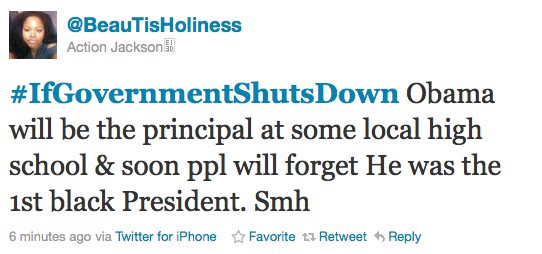
The airwaves have been flooded with pundits talking about all the ramifications, fallouts and consequences of a government shutdown. Is Michele Bachmann’s posturing mostly in support of her 2012 ambitions? Are the Democrats using the threat of a shutdown as a fund-raising device? Is it true that Congress will hire scabs to keep the seats filled during negotiations? Yes. Yes. Sure! And yes, Christine O’Donnell is available!
But what do real people think will happen? Below, a tapestry of Twitter pundrity that sums up, as well as anyone really, what America faces should the government shut down.


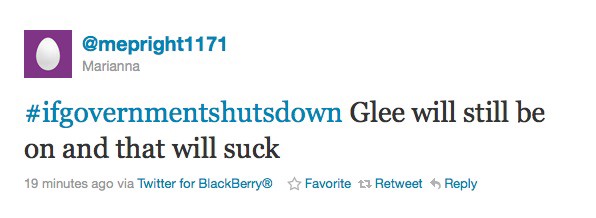
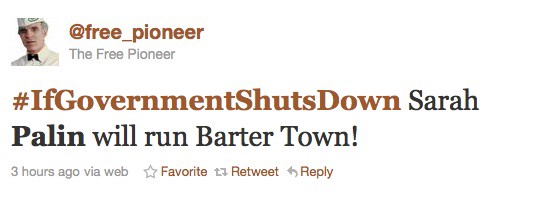
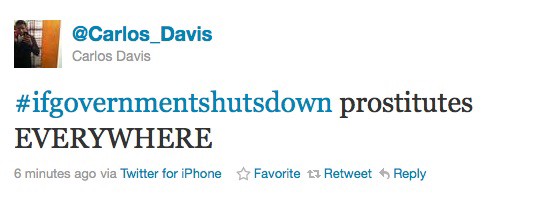


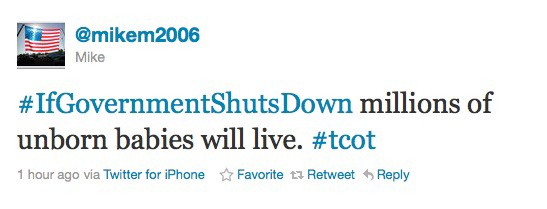


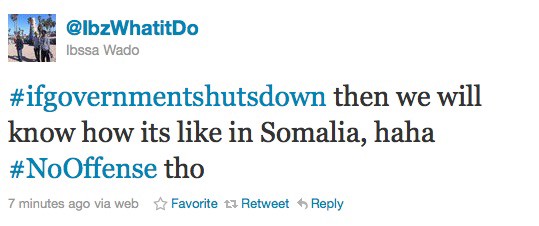
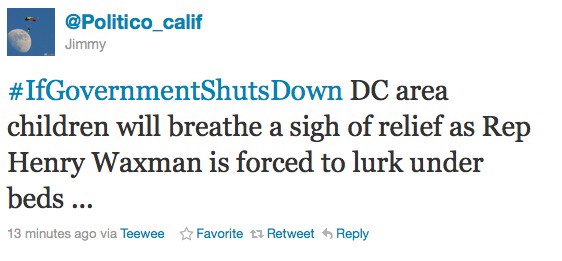


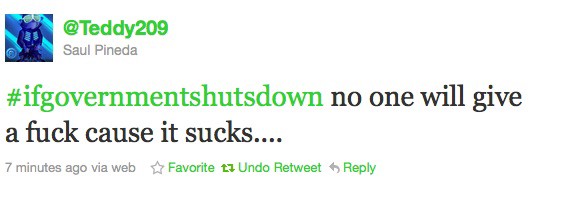

Abe Sauer can be reached at abesauer at gmail dot com.
Cathie Black Now Not In Charge of Our Children's Future
And also this morning: Cathie Black is donezo as New York City’s schools chancellor. Ms. Black was installed in the position with the caveat that she have a “minder” who had some experience working in the school system; Ms. Black’s experience was as a member of the board of Coca-Cola and as president of Hearst Magazines. She began the job on January 1. This is enjoyable: “A NY1-Marist poll released on Monday put Ms. Black’s approval rating at 17 percent, with 23 percent of adults not sure or never having heard of her.” We really, really look forward to further details.
